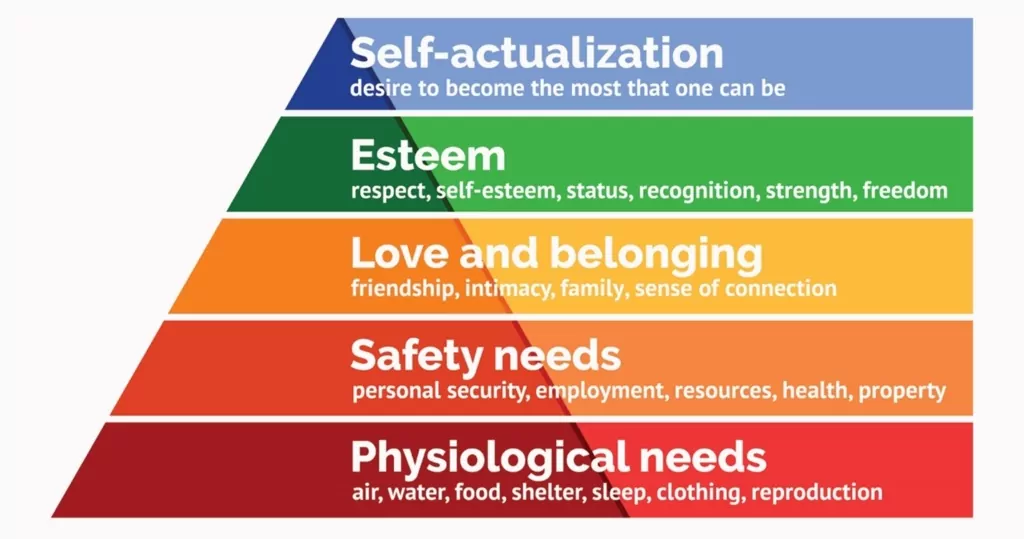“I’ve been two years in this job, it’s time for a change.”
“The only way to progress in my field is by changing where I work.”
“I want more pay, so I have to look for another job.”
All of the above familiar quotes ignore one critical element: job satisfaction. If you analyze Maslow’s hierarchy of needs, a higher salary – generally falling within the “Safety needs” category – is much lower on the list than job satisfaction, which can be a huge part of the first three tiers: Self-actualization, Esteem, and Love & belonging. Ultimately, being fulfilled in your job is a lot more important than chasing a higher paycheck.
As you progress up the tiers, it is apparent that more important than money are things like recognition, family, a sense of connection, status, and esteem.
Companies love comparing themselves with the competition. As Disraeli so aptly put it – “There are three kinds of lies: lies, damned lies, and statistics.” And companies use lies statistics to prove how good they are as opposed to the competition. Companies cherry-pick features where they have an advantage, and then display a table with their ability to cover these features, ostensibly showing where the opposition is lacking. And then they push their analysis to potential employees to show why they are the best company to work for.
But let’s take the standard competitive analysis template and apply it to job satisfaction.
Employees may think a higher salary will make them happier at work; newly released data, however, suggests another factor may actually have more of an influence on job satisfaction.
- Workers who report being unhappy with their job say they feel compensation has the biggest effect on how pleased they are — or aren’t. However, research has found employees who describe themselves as mostly happy or elated with their current role actually rate meaningful work as the most important aspect of a job.
- Another finding showed employees who have taken a pay cut to boost their happiness are 63 percent more likely to be happy with their job than workers who haven’t.
- Both satisfied and unsatisfied employees ranked the ability to work remotely and/or have flexible hours as the second most important job happiness feature. Management and leadership, office location, and a company’s culture and reputation were also identified as influential factors.
Over a career spanning over 30 years, I have worked for both big companies, including some of the biggest banks in the world, and small companies, including many that are leaders in their respective fields. At the very beginning of my career, I bought into the “must change job every 2 years at most” concept, but on reaching the age of 30, I started to realize that money isn’t everything, especially when spending the largest portion of my waking hours in an office, away from family and friends. So, my job duration since then has been between 6 and 9 years per job.
Why did I leave any of these jobs? Various reasons, but money was never one of them. I even moved to lesser-paying jobs to increase daily satisfaction.
So, in my opinion, what should you look for when job searching:
- People who have been in the company a long time. This more than anything else is a sign that the company is a place with satisfied employees.
- People in the company have a different job from their starting job. This means that the company is willing to promote from within and not always look outside to fill positions. It doesn’t even have to be career advancement. One employee I know started his career as a trainer and moved in to support and has since changed departments twice within the same company as this is what he wanted and in a company happy to accommodate his ambitions. When career changes are available in the same company, why look elsewhere?
- A fair salary. For any position, there is a salary range. You need to be within that range, but it is less important whether you are at the top or bottom end of the range. And remember, when things start to go belly up, as I’ve witnessed a few times, like when the markets crashed in 2008 or Covid resulted in major layoffs, if you have a higher salary than is fair, you are more likely to be one of the employees made redundant, and at a time when finding a new position is not so easy.
Other important ingredients to job satisfaction, like being shown respect for what you do, and having what you do recognized, are also very important but not as easy to find out while job hunting.
And on a personal note, after working for large multinationals, my preference is for smaller companies with a family atmosphere. This is one of the things I look for when considering a new job.
My current job, at CTERA, is special in that it ticks all the above requirements, including my preference for small, family-type environments, and, probably less important, but nevertheless, the icing on the cake; it comes with a competitive and generous salary. After almost 7 years at CTERA, I still wake up eager for the day, every day.
When waking up in the morning to go to work is something you want to do, you know you have found your perfect job!
About the Author
After several years first as a programmer and then as an analyst/programmer Julian moved into the field of technical writing where he has more scope for input across a product offering. Julian is currently the Director of Product Documentation at CTERA and is responsible for all documentation and knowledgebase content.


